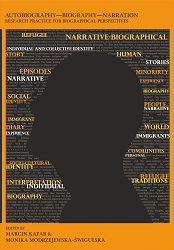
We kindly inform you that, as long as the subject affiliation of our 300.000+ articles is in progress, you might get unsufficient or no results on your third level or second level search. In this case, please broaden your search criteria.

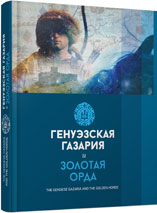
The author publishes a Turkish navigation map held by the State Historical Museum (Moscow). It is executed in the manner traditional for the European cartography, yet with Turkish inscriptions using Arabic alphabet. The map shows the Black Sea with its northern, eastern and southern shores (the western part is cut off ), as well as the whole of the Azov Sea. The article minutely studies stylistic features of the map. There is a table with the list of geographic names found on the map (toponyms and hydronyms): the original Turkish spelling and transcription and their respective identifiable modern names.
More...
Works of O. A. W. Dilke, A. Diller, P. Schnabel, J. Fischer and others enable the author to conclude that the handmade maps are descendents of Ptolemy's maps. An alternative hypothesis (i. e. that the maps were a later product by the Byzantine scholars who used Ptolemy's text) seems to be not very well grounded.
More...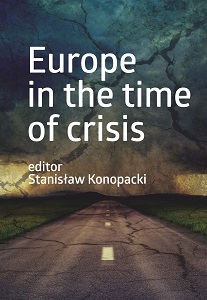
It is well known that since the 1980s the political importance of regional political movements in Europe has grown ever more and yet there exists a huge amount of mostly political and sociological investigations about the phenomenon. The majority of the authors seem to agree, that the regionalist movements should be viewed in relation to discrepancies between the respective national government and the supranational European level.
More...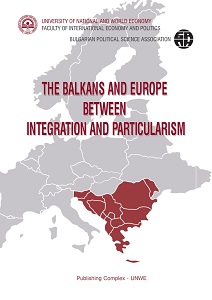
It would not be an overstatement to claim that political cooperation on the Balkanshas been thwarting in the last three decades. Looking retrospectively, it becomes very conspicuoushow scarce, inconsequential or even dead-born have been the attempts at multilateral cooperationamong the Balkan states in that period. The present paper offers possible answers to the question"Why regional political cooperation on the Balkans has not marked sufficient success after the endof the Cold war?" Usually answers are sought in historical past and experience from previousinteractions and/or influence and intervention from extra-regional (f)actors. These (f)actors by nomeans should be neglected. Our claim, however, is that answers should be sought also on regionaland internal political level. In other words, in explaining the crippled efforts at all-Balkan political cooperation we look at internal political actors and the ways they might perceive externalstimuli and incentives. We argue that unlike previous historical periods when external environment and circumstances were rather unfavorable or even hostile to cooperation within the Balkans, since the beginning of the new century the external environment produces more positive incentives and stimulates political cooperation on the Balkans. Hence, the uncertain and stumblingpolitical cooperation on the Balkans is not due to external (f)actors. The emphasis on the internalpolitical actors reveals that political cooperation among Balkan states depends significantly onthe actors’ political will. Thus, the (im)possibility of Balkan political cooperation leans on theways political actors in the region perceive and interpret the signals from external environmentand communicate them back and forth to the national internal settings.
More...
Innovations are making the world more and more interconnected, but some regionsand countries are performing better than others. The topic is particularly important due to thelatest developments in the Balkan region, which has important political, economic and culturalspecifics that distinguish it from other parts of the world. They are linked with the particularitiesof projects and realities of cooperation activities in a regional context. It is vital to give specificattention to the topic also because of the opportunities that can be developed to benefit all partners in the region. At the same time one should be aware about the challenges that have to betackled in the process of enhancing the cooperation and connectivity in the Balkans.The present paper explores the opportunities that innovation holds for enhanced cooperationand connectivity in the Balkan region. Best innovation practices will be discussed to increase theawareness about the complexities of the topic, which requires serious analysis that draws on theexpertise of professionals across borders.
More...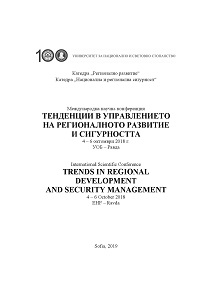
The problems of the modern labor market are subject of growing interest in the research field of the political discussions and management practices. Of particular relevance they acquire at the beginning of the period of economic and political transition, they deepen according to the Bulgaria's membership in the European Union, and in more modern times arise into the new challenges in the new demographic, economic and social realities. One of the key and at the same time most complex tasks of the modern economy is the formation of an effectively functioning, dynamic and civilized labor market.
More...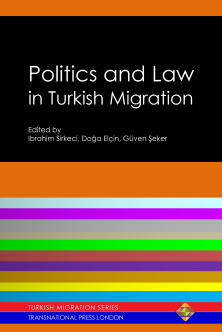
The political participation of Mowassat, Özkan, or Sharma alongside Schmidt, Maier, or Beck is already a routine part of German politics. But scholar interest has not yet been directed towards politicians with migration backgrounds in Germany. Politicians, as the faces of political parties, are not only the movers of electoral politics. Diversity among party faces hints at the composition of the given society and its politics.
More...
The main aim in writing this paper on German-Turks is to present an exploratory analysis on the Turkish community in Germany.Through a series of in-depth interviews with younger generations of German-Turks in Berlin, it is focused on their preferences concerning citizenship issues and attitudes towards their home as well as host countries. The role of their overall approach towards citizenship issues in shaping their political participation strategies in both German and Turkish contexts is also underlined.
More...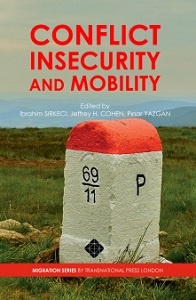
This chapter explores the social and political relations of Kurds from Syria and Turkey, who were living together in a neighbourhood in Istanbul. Kurds from Qamishli in Syria have relatives across the border in Turkey. They are kin who have been separated in the creation of the two nation states. The border did not deter continued ties, marriage, movement and exchange between them. As a consequence of the conflict in Syria, many Syrian nationals came to Istanbul to make their lives there. For many of those with family on the Turkish side of the border, they chose to settle in areas where their Turkish relative are living. For many, it is their first extended encounter with the Kurds of Turkey- their kin from across the border- while others have continuously come and gone to Istanbul for various reasons.
More...
I grew up listening to a story that did not strike me much at the time. My father, who was born in 1925, is a dengbêj (folk poet) and he told me a story explaining the reason for the statelessness of the Kurds in their ‘failure’ to unite under one leader and join a cause. It is a story about the famous Kurdish leader Cemil Çeto who prepared to fight the Kemalist movement. It was the moment when he saw an opportunity to call upon foreign powers to support the Kurds and assist them in founding a Kurdish state. He meets the leaders of seven tribal confederacies and claims that he can bring France’s air force to their help in seven days. Only, he insists that a leader must be chosen, either himself or someone else, who will represent the Kurdish coalition internationally and negotiate with the French. Eminê Ahmed, one of the leaders present, stands up and says that he will never relinquish his title or give his father’s legacy away to bow to anyone else. Others follow him in that decision. In short, according to the story the chance to establish a Kurdish state was missed because of the lack of unity among Kurdish leaders and such an opportunity was never obtained again.
More...
The engagement between military and migration calls to mind either migration of soldiers or migrations at the time of war or military coup. Military migrants and their families (Ware, 2012; Cooke & Speirs, 2005), as well as comparisons of veterans and non-veterans (London & Wilmoth, 2006: 135) have received attention since World War II in the literature, particularly from life course approaches (Wilmoth & London, 2013). Special interest has gone to experiences of American soldiers and their psychological and health problems. But this chapter is not related, in this sense, to military migration.
More...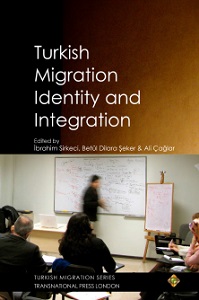
While recent studies have investigated intra-European mobility of EU citizens (Favell, 2008; Recchi & Favell, 2009) and the transnationalisation of selected European societies (Mau, 2010) the main goal of this paper is to shed light on border crossing mobility practises of Turkish migrants residing in member states of the European Union. Particularly, it is of interest to investigate whether the third-country migrant status influences the extent to which these individuals make use of the common European mobility space. To allow for an assessment of this question, their data will be contrasted with that of intra-European migrants from Romania. Existing studies, such as Neumayer (2006), clearly show the impact of visa regulations on international mobility. One of his arguments is that for citizens of most countries in the world from a practical point of view, the national passport is less important than the visa it contains (or lacks). Therefore, it could be assumed that the question of whether or not Turkish migrants reside within the Schengen area has a direct impact on their intra-European mobility. To review this issue, survey data collected both in signatory and non-signatory countries of the Schengen agreement is used in the analysis. The first part of the paper provides an overview of the data used, while the second part presents some insights in physical and non-physical mobility of Turkish migrants. The final part of this text discusses the results of regression analysis, which uses intra-European mobility as a dependent variable and, among others, country dummies, different socioeconomic characteristics and communication with individuals abroad as independent variables.
More...
Alevi immigrants from Turkey who live in European countries have actively established associations for solidarity and for demanding democratic rights for Alevis back in Turkey. They do not only struggle for the official recognition of Alevi belief and places of worship in the host countries such as Germany, Netherlands, UK and France, where these demands can be accommodated through existing laws in the host countries, but they also strive for recognition in the host countries to set an example for desired improvements in Turkey itself and thereby transform Turkish society in such a way that Alevis’ rights are improved. Consequently Alevi demands focus on obtaining recognition “as a distinct community in a particular, nonstigmatising way” (Sökefeld, 2008, p. 17). For Alevis being recognised means both the acceptance of the distinct qualities of their belief system and also being free from stigma and discrimination due to these differences. This is described as ‘equal citizenship’ (eşit yurttaşlik) by the leaders of the Alevi movement.
More...
Identity, as a theoretical and phenomenological notion, has long been a part of international migration studies (Coll and Falsafi, 2009; Vertovec, 2001). Immigrant identity and belonging has also been a part of the literature on immigrant integration because immigrants’ perception of their own identity and that of the host society influence the processes of integration. Esser (as cited in Sahin, 2010) states that identity is an important dimension of social integration. It is related to an individual’s sense of belonging to a place and a community. In this process, education also has a role to play. Formal education institutions are fundamental arenas for the construction of identity. Indeed, individuals are driven through a systematic process of identity formation at school as determined by the state. In fact, the learning itself is an experience of identity. This applies to immigrants as well.They gain their perceptions of being and identity in the society during their school years. These perceptions influence their integration. Many scholars have stressed that teachers’ personal backgrounds, as well as their identities, impact on their views of teaching. Teachers bring themselves and their personalities into the classroom. The teachers’ backgrounds influence what is taught, interpretations of classroom situations and students’ behaviours, as well as pedagogical decisions (Koopmans, 1999; Mosselson, 2011; Wenger, 1998; Coll and Falsafi, 2009; Smith, 2000; White, Zion, and Kozleski, 2005). Therefore, it is critical to investigate the integration of Turkish immigrants in Europe in relation to the identity of teachers from Turkey. This study aims to shed some light on this process.
More...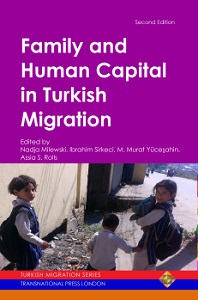
In the 1960s, German industry was in need of low-skilled labour and started to recruit ‘guest workers’ (Crul and Vermeulen 2003: p. 970). Many of these labour migrants came from Turkey. In 2011, about 1.6 million individuals of Turkish origin lived in Germany, constituting that country’s largest migrant group (Statistisches Bundesamt, 2011). Several studies report that on average, the socioeconomic status of Turkish immigrants is lower than that of native Germans. Furthermore, they are the least well integrated migration group in Germany (Diehl & Schnell, 2006). Research in Germany mainly focuses on the German language ability, but knowledge of the heritage language can help to maintain the immigrants’ ties to their ethnic culture, which in turn can facilitate their psychological adjustment. The stronger roots in the ethnic culture may facilitate their social and cultural adjustment through the ethnic community and may also facilitate their adjustment to the host culture (cf. Park et al., 2012). In the following paper we seek to answer the question of how children of Turkish immigrants in Germany are able to learn their heritage language (language retention/maintenance).
More...
For more than a decade the countries of the European Union (EU) have been chasing their ambition to make Europe a centre of excellence’. In 2000 they formulated their common goal of making the EU the most competitive and dynamic knowledge economy of the world in the Strategy of Lisbon. The European Recovery Plan of the European Commission, which aimed to combat the most recent economic crisis, emphasized the importance of the innovative knowledge economy and scientific research (European Parliament, 2010). To fulfil the targets of the Europe 2020 Strategy (e.g. increasing productivity, competitiveness, economic growth, solving the problem of labour shortage in sectors of innovation), stimulating intra EUlabour mobility or needs-based migratory flows were named as relevant policy tools. Similarly, encouraging highly skilled immigration from non-EU countries was considered to be essential. In the EU, the share of the highly educated among migrants born outside the EU was almost negligible - only 2% - compared with 4.5% in the USA, 8% in Australia and almost 10% in Canada. As a consequence, the EU-countries got engaged in a global ‘battle for brains’, not only as a union, but at the same time among themselves in order to attract the ‘best and the brightest’ and to reach sustainable economic growth.
More...
Germany is facing a shrinking and ageing population due to a sustained decline of the country’s birth rate and a longer life expectancy of its population. As a result, the population is expected to decrease to 70 million in 2030 (BMAS, 2011), from 80.62 million in 2013 (Statistisches Bundesamt, 2014), while the labour force is predicted to drop by 4% between 2010 and 2020 (OECD, 2013a). The German Federal Employment Agency (FEA), moreover, expects a skilled labour deficit of around 5.4 million in 2025 (FEA, 2011). This development preoccupies policymakers as well as business representatives, because the availability of highly qualified human capital is seen as a basis for the country´s prosperity (Czernomoriez, 2009). Especially the growing shortage of specialists in the MINT subjects, i.e. Mathematics, Informatics, Natural Science and Technique, might have severe consequences for the economy. In order to find a way to cope with this situation, the attraction of highly skilled people from abroad has come into the focus of German politics. Hence, with the New Immigration Act (“Zuwanderungsgesetz”) in 2005, Germany officially accepted its status as an immigration country, and accordingly put a regulatory framework in place. Consequently, the new law and its following modifications made Germany one of the countries with the lowest entry restrictions to the domestic labor market towards highly-skilled migrants within the OECD area (OECD, 2013a).
More...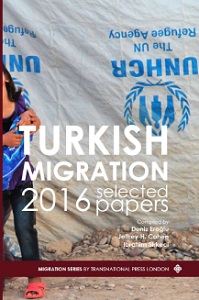
The paper begins with a quantitative analysis of the changes in refugee’s situation over the past 15 years with a discussion on major refugee holding countries. Then a specific quantitative analysis of the role of Australia and Turkey’s history of accepting and resettling refugees will be explored. This is of particular interest as it will demonstrate that three modulating factors, namely, the historical background of the host country, its proximity to troubled regions and its political environment, could have contributed to the changing roles of both countries in resettlement of refugees over the past 15 years. Subsequently, a comparative analysis approach encompassing a qualitative analysis will be used to compare new laws adopted by both countries to provide working rights for refugees, namely Turkey’s Regulation on Work Permit of Refugees under Temporary Protection in January 2016, and Australia’s adoption of Safe Haven Enterprise Visa (SHEV) in July 2015. Both Australia and Turkey’s introduction of their respective law whilst only provides temporary protection does extend the current rights to provide working rights.
More...
There are some man-made problems such as civil conflicts, wars and environmental problems such as global warming, water-food scarcity in many parts of the world. According to the United Nations High Commissioner for Refugees Agency (UNHCR) Global Trends Report (2015, 18 June), at least 15 clashes have erupted or re-fueled in the last five years: eight of which in Africa (Ivory Coast, Central African Republic, Libya, Mali, Northeastern Nigeria, Democratic Republic of the Congo, South Sudan and Burundi), three of which in Middle East (Syria, Iraq and Yemen), one of which in Europe (Ukraine) and three of which in Asia (Kyrgyzstan and in many parts of Myanmar and Pakistan). As a result of events that are similar to these situations, many people are forced to leave their homes but some of those people can’t do this. In such cases, these people should evacuate to safe locations. In this study, in order to clarify the status of displaced people and explain the importance of the right to evacuation; the problems especially man-made lead to displacement, the effect of these problems to the right to evacuation, displaced people and the fact that people must have right to evacuation as well as the right to life are addressed by reviewing literature and creating a model about who will carry out the evacuation operations. Furthermore, the right to evacuation is handled within the context of international law and domestic laws of Turkey and the United States of America (USA).
More...